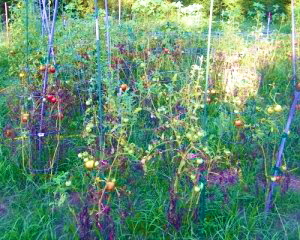“To be old is one thing, to be old and a victim is another. An entirely new category of person—someone vulnerable, helpless, unable to cope. Little more than a baby. What worried Aldous most was how eager people were to see him in this way. What, apart from the numerical accumulation of years, had happened to him to bring about this change?”
 Aldous Rex Llewellyn Jones, an elderly widower living alone, has nothing to look forward to. A former art teacher now living an isolated life inside a house for which he takes as little care as he does for his personal hygiene, Aldous avoids contact with the outside world, even with his own children. One son lives in Belgium, another lives in the Venezuelan jungle with his Icabaru wife and child, and a daughter Juliette, a reporter for the London Evening News, has her own life. It is not until he opens a cupboard and discovers that a forgotten bag of potatoes has sprouted and taken over the entire inside of one drawer that he has his epiphany—”Some old potatoes in his cupboard were more actively interested in life than he was.”
Aldous Rex Llewellyn Jones, an elderly widower living alone, has nothing to look forward to. A former art teacher now living an isolated life inside a house for which he takes as little care as he does for his personal hygiene, Aldous avoids contact with the outside world, even with his own children. One son lives in Belgium, another lives in the Venezuelan jungle with his Icabaru wife and child, and a daughter Juliette, a reporter for the London Evening News, has her own life. It is not until he opens a cupboard and discovers that a forgotten bag of potatoes has sprouted and taken over the entire inside of one drawer that he has his epiphany—”Some old potatoes in his cupboard were more actively interested in life than he was.”
His garden is in the same state of wild neglect, and it is only a short step for Aldous to imagine that the garden might one day soar over the rooftop and embrace all four walls of his house, while the potato tubers fill his rooms. He envisions expiring and the firemen having to saw through tree roots and thickets of plum trees to find the door, then opening it to find a skeleton with potato tubers growing out of his eye sockets.

Sardonic and filled with darkly humorous imagery, A Curious Earth, by Man Booker finalist Gerard Woodward, is an old-fashioned novel, more an extended character study and meditation on aging than a traditional plot-based novel. Very much in the style of British authors Elizabeth Taylor (Mrs. Palfrey at the Claremont), Molly Keane (Time after Time), and Alice Thomas Ellis (Pillars of Gold), whose sly humor and pointed observations about people and society make their novels such wry delights to read, Woodward also creates in Aldous a character who is so universal in his concerns and needs that the reader cannot help but empathize with him, even when he is being impossibly self-absorbed.
When Aldous goes to see The Winter’s Tale, he befriends some of the young people there, and soon he begins visiting the National Gallery, where he is fascinated by Rembrandt’s painting of Hendrickje Stoffels, his young mistress. The possibilities of an old man enjoying life with young people, and especially a young woman, offer Aldous new hope, and when his son Julian, living in Ostend, Belgium, invites him to come for a visit, Aldous, looking forward to new scenery and new opportunities, goes with his eyes open. Unfortunately, he forgets to keep his mouth closed. On the ferry, the ferocious gale winds blow his teeth overboard just as he is about to start his new adventure.
 In Ostend Aldous meets “the most beautiful woman he has ever seen,” who turns out to be a fellow artist, and his dalliance with her proves that “true love” can conquer all, even for a toothless old man–at least temporarily. Before long he is also befriended by Herman Lorre, “the greatest sexologist of the twentieth century” and begins partying with Julian and his friends. Rejuvenated, he begins night classes upon his return to England, and is soon drawn to another younger woman with whom he can share his interest in galleries, plays, and music.
In Ostend Aldous meets “the most beautiful woman he has ever seen,” who turns out to be a fellow artist, and his dalliance with her proves that “true love” can conquer all, even for a toothless old man–at least temporarily. Before long he is also befriended by Herman Lorre, “the greatest sexologist of the twentieth century” and begins partying with Julian and his friends. Rejuvenated, he begins night classes upon his return to England, and is soon drawn to another younger woman with whom he can share his interest in galleries, plays, and music.
Throughout the novel, Aldous misreads signals and invests far more emotionally in his relationships than do his new friends. Life starts to become interesting for him,  and then becomes devastating, over and over again, as Aldous learns the hard way that life takes work, just as the potato tuber must work to keep on growing in the darkness of a closed drawer, feeding on itself. As the novel develops and Aldous continues to see “human contact as the only thing keeping him from death,” he seeks new friends and reconnects with old ones. Always, however, he is surprised at how incomprehensible the lives of other people seem to be, even more so when he views them through the bottom of a bottle.
and then becomes devastating, over and over again, as Aldous learns the hard way that life takes work, just as the potato tuber must work to keep on growing in the darkness of a closed drawer, feeding on itself. As the novel develops and Aldous continues to see “human contact as the only thing keeping him from death,” he seeks new friends and reconnects with old ones. Always, however, he is surprised at how incomprehensible the lives of other people seem to be, even more so when he views them through the bottom of a bottle.
As Aldous deals with the minutiae of life, turning each step and each decision into a major event, the reader sees that for an elderly man like Aldous the minutiae of life often are his whole life, and that a man who has let life happen to him is like the baby he fears he has become—”vulnerable, helpless, and unable to cope”—though his hopes and dreams may be the same as they were in middle age.
W ith his unique imagery and eye for the ironic or bizarre detail, Woodward makes Aldous, his friends, and his daily life come vividly to life in this quiet, unpretentious novel. He uses dark humor to make observations about age which are sharp and memorable. Though there are moments of profound sadness, there are also moments of hope for Aldous’s belated self-awareness and enlightenment. Woodward never descends into pathos or sentimentality, reminding the reader that life is often absurd and that ironies can be found and appreciated even in the most difficult situations. Readers who enjoy character studies—especially older readers who may identify with Aldous or see their friends in some of his behavior—and those who appreciate black humor—will delight in the irreverence with which Woodward approaches the subject of old age. (This novel is the top of my Favorites List for 2008.)
ith his unique imagery and eye for the ironic or bizarre detail, Woodward makes Aldous, his friends, and his daily life come vividly to life in this quiet, unpretentious novel. He uses dark humor to make observations about age which are sharp and memorable. Though there are moments of profound sadness, there are also moments of hope for Aldous’s belated self-awareness and enlightenment. Woodward never descends into pathos or sentimentality, reminding the reader that life is often absurd and that ironies can be found and appreciated even in the most difficult situations. Readers who enjoy character studies—especially older readers who may identify with Aldous or see their friends in some of his behavior—and those who appreciate black humor—will delight in the irreverence with which Woodward approaches the subject of old age. (This novel is the top of my Favorites List for 2008.)
ALSO by Woodward: LETTERS FROM AN UNKNOWN WOMAN (NOURISHMENT), A CURIOUS EARTH, VANISHING, and AUGUST (link to Amazon review).
Notes: The author’s photo is from http://www.dailymail.co.uk
The overgrown and neglected garden, which Aldous imagines might “one day soar over the rooftop and embrace all four walls of his house,” is seen on http://mowersgarden.blogspot.com
When Aldous visits the National Gallery, fascinated by Rembrandt’s painting of Hendrickje Stoffels, his young mistress. This Rembrandt painting is shown on http://www.wikigallery.org
The photo of Ostend, Belgium, is on http://europeforvisitors.com
